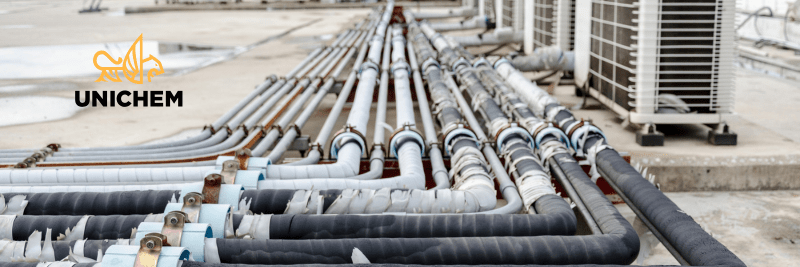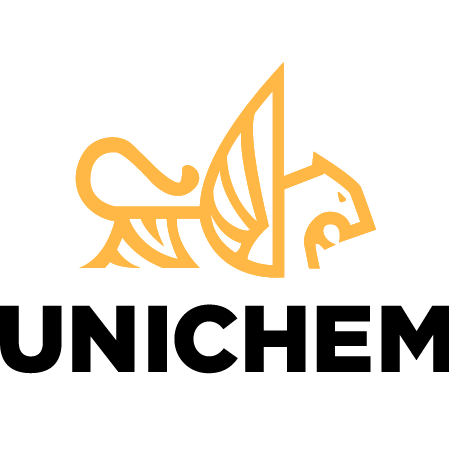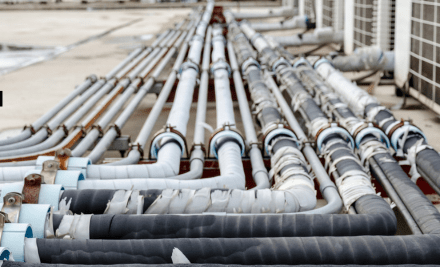
Maintaining clean air in residential, commercial, and industrial spaces is essential for human health and safety. HVAC systems, while critical to this process, often become breeding grounds for harmful microorganisms like bacteria, mold, and fungi, especially when moisture and dust accumulate. Antimicrobial coatings provide an essential protective barrier that reduces microbial growth, enhancing both the safety and efficiency of HVAC systems. UNICHEM’s antimicrobial coatings for HVAC systems can help improve air quality, reduce maintenance, and extend system longevity.
The Role of Antimicrobial Coatings in HVAC Systems
HVAC systems are susceptible to microbial contamination, especially in humid environments. Microbes such as bacteria and mold can thrive in ducts, air filters, and other system components, potentially causing health problems such as respiratory infections and allergies. Antimicrobial coatings applied to HVAC equipment help combat these issues by preventing the growth of harmful microorganisms.
The use of coil applied antimicrobial coatings in the production of appliances and HVAC equipment provides many benefits, as highlighted by the National Coil Coating Association. Additional benefits include the ability to add antimicrobial technology such as UNICHEM’s uniCLER to the coating to enable the coating to resist growth, reducing the buildup of microbes. By applying antimicrobial coatings during the coil coating process, HVAC components are protected from microbial build-up, which in turn improves air quality and system efficiency.
How Antimicrobial Coatings Work in HVAC Systems
Antimicrobial coatings contain agents that inhibit the growth of microorganisms. Silver ions or other active ingredients disrupt microbial cell walls, preventing the bacteria or fungi from multiplying. Once applied to HVAC components, such as coils and air ducts, these coatings offer continuous protection, reducing the risk of contamination and the need for frequent cleaning.
By protecting these high-risk areas, antimicrobial coatings significantly reduce the maintenance burden on building owners. HVAC systems can function more efficiently with fewer microbial obstructions, leading to better airflow and reduced energy consumption.
Enhanced Durability and Reduced Maintenance
In addition to protecting against microbial growth, antimicrobial coatings increase the durability of HVAC systems. By preventing the formation of biofilms, which can cause coatings to degrade more rapidly, the coatings extend the lifespan of metal components like ducts, cooling coils and air filter housings.. This protection also ensures that HVAC systems remain energy-efficient over time, as clean components allow for optimal airflow and reduced energy consumption.
Antimicrobial coatings can also contribute to reducing long-term maintenance costs. By preventing microbial growth, these coatings lessen the need for frequent system cleanings, making HVAC systems more cost-effective to maintain. This is particularly beneficial for commercial and industrial environments, where HVAC systems operate continuously.
UNICHEM’s uniCLER Antimicrobial Coating Technology
UNICHEM’s uniCLER antimicrobial coating technology is designed to protect HVAC components from harmful microbial growth. The uniCLER line uses advanced antimicrobial agents that disrupt the life cycle of microorganisms, inhibiting their growth, thus,reducing their presence on treated surfaces. These coatings are durable and long-lasting, providing continuous protection against bacteria, mold, and fungi.
The uniCLER antimicrobial coating be applied to the coil applied coatings as part of the manufacturing process. This flexibility ensures that all high-risk areas are adequately protected, improving air quality and system performance. The benefits of using UNICHEM’s antimicrobial coatings include long-term protection, enhanced energy efficiency, and reduced maintenance costs.
Coil Coating: The Ideal Application Method for HVAC Antimicrobial Coatings
Coil coating is a highly efficient and effective method for applying antimicrobial coatings to HVAC components. During the coil coating process, the metal substrate is cleaned, coated, and cured in a continuous process that ensures even coverage and strong adhesion. This process produces a durable, long-lasting finish that enhances the performance and lifespan of HVAC systems. The continuous application ensures that coatings are evenly distributed across the entire surface, offering protection against corrosion, microbial growth, and environmental damage.
Antimicrobial coatings, particularly when applied using the coil coating process, are an essential solution for enhancing the efficiency and longevity of HVAC systems. These coatings help to minimize microbial growth, improve air quality, and protect system components from corrosion and degradation. UNICHEM’s uniCLER antimicrobial coatings offer advanced, long-lasting protection that reduces maintenance costs and ensures consistent performance in HVAC applications. By investing in coil-applied antimicrobial coatings, HVAC systems can deliver cleaner air, lower energy costs, and a safer environment for occupants.
UNICHEM offers over 50 years of experience in developing high-performance coatings including antimicrobial coatings for HVAC applications. Our solutions enhance system durability, improve air quality, and reduce maintenance costs. Contact UNICHEM to learn more about how our coil-applied antimicrobial coatings can benefit your HVAC systems.


